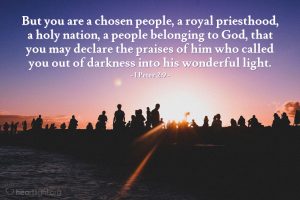1 Peter 2.4-12 and Ephesians 4.4-16

‘But you are chosen people, a royal priesthood, a holy nation, God’s special possession, that you may declare the praises of him who called you into his wonderful light.’ 1 Peter 2.9
Are you a don’t look back, look forward type of person or do you spend time pondering the if only question? Have you wished you had said something while there was still a chance, written that message or sent some flowers? Do you spend time wishing you had been bold enough to have made a different decision? Perhaps you wish you had gone, when instead you stayed or gone when you should have stayed. A lot of this is tied up with how we manage our feelings. Our emotions are strong forces that either drive us on or prevent us taking action despite what we may know is right.
Shortly before my Father died I realized I wasn’t sure if I had ever really told him how much he meant to me. And I think he was the most formative person in my life. We lived three to four hours drive away, the family were growing and demanding of time and so we only saw each other during school holidays when there seemed more time. It suddenly became important to me to say to him what was deep in my heart but I knew it would never work out face to face. So, I wrote him a letter. It was never mentioned until I was alone with him some months later in the hospice and I said to him, ‘I would just like to say how important you are to me.’ He replied, ‘I know, you wrote me a letter.’ That was all either of us needed. I am not sure how I would have coped if I hadn’t written the letter.
What regrets will we have as we are judged by a ‘Father who judges each person’s work impartially’. 1 Peter 1.17 In particular what will we regret not saying in the light of Peter’s conclusion to the quote to, ‘live out our time as foreigners here in reverent fear’? When Peter and Paul are writing they are addressing believers individually but they are also speaking to the church as a whole and expecting the church to respond and act as one whole entity. Paul uses the biblical analogy of the church being the body of Christ and Peter of the church as a spiritual building. How good is the modern church at being a unified body or building directing its energies in a collective ‘declaring the praises’ of him who saved us.
The declaring of praises is much more than singing worship songs and prayer in the confines of a church building or home group. It is the obedience to the great commission to, ‘Go and make disciples of all nations, baptizing them in the name of the Father and of the Son and of the Holy Spirit, teaching them to observe all that I have commanded you.’ Matthew 28.19,20 There are three broad strategies to achieve this, each one essential. Holiness of life, that is a life set apart overcoming sin that makes us aliens in our own world. Good works that are derived from God’s grace towards us. The proclamation of the gospel. The church is called to be at one in all three areas. Which if any do you struggle with? God has done all that is necessary for us to be obedient. All three in their own ways declare the praises of him but perhaps the one we may most regret when meeting our God is whether we have shared the gospel with others.
God has empowered the church through the gift of the Holy Spirit.
He has equipped the church for the work of ministry through the, ‘apostles, the prophets, the evangelists, the shepherds and teachers.’ Ephesians 4.11
He has given the church the identity and authority to convey the word of God and make disciples. 1 Peter 2.9
In that case why is the modern church frequently so reluctant and ineffective in reaching people with the gospel? Here are some thoughts to address what is for God a vital issue.
Follow the money – How much of the churches resources (people, time, money, events, prayer) go into reaching out to people with the gospel.Training and equipping – How does the church equip itself to communicate the gospel in helping people understand the gospel, the questions people ask, the ways to listen, explain, mentor and coach people who do not yet believe?
Invitations – How often and how many are invited to join in with the family of God. It can be small social gatherings, films, quizzes, courses, individual bible reading, church services.
The attention we give to make the Christian life understandable – From what is done in church to why Christians make different decisions.
Engaging with the market place – The apostles met people where they were, by a river, in the street, in a place of worship, in a community hall, in people’s houses, all with the deliberate intent to share the gospel. Where do people meet now with an open mind?
Friendship – Have we ever asked a friend to come to a Christian function or do we think it will hurt the friendship? Have we ever explained to a friend why we believe and why it is so important to us?
What regrets will we have as we meet our Father?
Here I am Lord




